- Home
- Sarah Hall
Burntcoat Page 7
Burntcoat Read online
Page 7
There’s a reason no one in their right mind wanted this ruddy behemoth. But you still need more space if you’re going to play mega-Lego in here. You need to get rid of that.
He pointed at the building’s middle wall. There was a casual discussion about whether it was load-bearing. We worked with sledgehammers, taking out the stone with wild swings, unpacking the building’s light and length, not knowing if the entire structure would collapse on us. He fetched his camera, stood unobtrusively, splay-legged, assessing the glint off the river. The shutter scraped closed at the perfect moment with the sound of a struck match. My arm was caught in its blurred motion like a piece of equipment, an explosive burst of sun behind it.
At night we cooked on a camping stove or ate at The Anchorman.
You’re not off the hook, he told me, this isn’t work.
I held up a calloused, grazed hand.
Feels like work to me.
No, they didn’t buy you with that dirty corporate cash.
Will you let me pay you?
You can buy me another beer and my ticket back home when we’re done.
You’re going back to Cape Town? I didn’t think you would.
What we couldn’t do we enlisted builders to complete. Money drained out of the account. The roof, the flooring, the heating, tiles. For the workspace, a lathe, saws, clamps and compressors, the Bullfinch torches – I would no longer have to work off site. We sourced industrial scaffolding so models could be constructed in the yard, and towards the end of the renovation Jonah set it up outside the building and began to write on the brickwork. I didn’t really know what he was doing until I climbed up to the platform and saw he was holding a copy of The Reddening in one hand, transcribing it in white masonry paint.
You’re on chapter eight?
Ja.
Burntcoat became some kind of chimerical home, the studio below, an upcycled bare-brick apartment above, two hemispheres, both me.
There are friends in life who save us then disappear from sight. They remain indelible in the heart. I went to Jonah’s wedding fifteen years ago and, though we speak on videocalls, I’ve not seen him since. Before he left, he insisted we have a party. We strung lights in the yard, set up a stereo system and invited everyone. Kendra arrived with several kegs. The music rang round the empty riverside and drew people over as if it were a concert. There were burning drums full of petrol and wood. I ended up with a woman called Ro, testing my boundaries, she said, which she didn’t seem to mind.
I’ve been responsible for loads of switches, she told me proudly. You have extraordinary skin.
She was clever, worked for a housing charity; she was horrified that I owned Burntcoat and kept propane under the apartment. We danced and kissed, went upstairs to use the bathroom. Jonah waved at me.
Is he your boyfriend?
He’s my Huckleberry.
She had heavy breasts, and pale-pink, almost disappearing nipples when she pulled off her vest, a stud in her tongue. She’d brought pills.
What is that?
It’s jade. Don’t worry. Open wide.
The green pellet dissolved to chalk, tasted of aspirin and zinc. After half an hour I led her to the bedroom. She’d been in similar situations before. She slowed it down. Her compliments were half political, designed to reassure and educate. She loved this part here, and here.
Feel for yourself, it’s so incredibly soft.
She sucked gently, as if I were a man, opened me, pushed her tongue inside, then her fingers. When she took her hand away I felt empty, incomplete. The warm metal stud clicked on her teeth, felt like a tiny knuckle wherever she used it. I was full of fireworks; light kept sparking in my head, my pelvis, between the discs of my spine. Every touch was like static, gorgeous, too much.
You should stay on this side, Edith.
OK. Sure.
She moved on to someone else after that night, but for those minutes and hours it seemed perfect. Downstairs, Jonah was dancing, bare-chested, unsynchronised, and everything around him was vivid and over-defined. Then there was a secondary phantom shape hovering beside him, and shapes beside the tanks of flame, the people moving in the shadows, a couple fucking upright on the fire escape. I could still feel Ro’s tongue.
At some point Jonah went to the balcony window above the river, opened it and stepped out. On the dock, people looked up, and Ro pointed.
Your Huckleberry?
He was standing naked, immaculate and still, his head cast down towards the water, like a heron, a saint. A few people clapped and whistled, as if the appearance was the performance. I knew he was going to jump. I knew Jonah, his reasons and reasonless commitments, his need for contrast. The river was deep and permissive, but its bed was planted with hidden wreckage.
He stood for a moment, put a foot on the shallow rail and pulled back, then launched himself outwards. I can still see it. His body in the air, a rigid human star, suspended, luminous in the building’s light, then dropping fast, his penis sailing upward, his fists clenched. Dark water exploded as he hit. He disappeared and waves gnashed against the sidings and the dock. I heard Ro exclaim,
No fucking way.
The shout when he surfaced was feral, half injured, half exalted. He tossed his head, swam to the dock. People cheered and jumped into the water. The party had been baptised. The police arrived within an hour.
But I saw, and I still see, a different version too, like the twin shapes the drug created. Jonah jumps and rides the air. The surface of the river closes over and the ripples calm. He sinks underneath, shedding oxygen in a long dry stream, and enters the serrated bed of the river. Beside old hulls and rusting motors, between the curtains of reeds, he stands, mouth open and flooded, his ankles wrapped in chain.
The bad wake of the pill, or the gravity-defying act, months of labour and adrenaline. The vast space where Naomi had been, into which my monster had risen. Whatever the trigger, I spent the rest of the night in quiet crisis in the yard, with Ro stroking my back, telling me no one had died, everything was fine, breathe, breathe. Blue lights bouncing over the river gave everyone enough time to disperse. The penalty fine is still pinned up in the kitchen, next to the original prints of Jonah’s photo series, Mind-House, like some kind of severance notice.
It might take a lifetime to know how to live. How it’s all made meaningful or tolerable, how to attain some semblance of wisdom. I’ve tried methods of accommodation and acceptance. Not being delighted or repelled by the world, by how it presents. Trying to see inside. To find essence, which is benign. I’ve travelled, walked pilgrim routes and all the mountains of the north, heading up into the fells in a solitary, fatal way. I’ve fasted and meditated. The year I turned fifty, I spent several months in South-East Asia. In Thailand I found a group. The leader’s name was Subhadassi, he was kind and had no sense of pity whatsoever. His small jokes in the morning confused the few Western participants. I tried to be as neither man nor woman, nor an artist. The robes were loose and rough, like rust wings; my identity was folded into a bag and left beside the pallet bed. We collected water to wash and drink, burnt coils of incense, repeated mantras. For several weeks I sat watching a corpse decompose. We continued living, talking, meditating with the grey blossoming presence among us.
This too is part of existence, Subhadassi told me. Meuan-gan.
At any given moment the body is simply its state: reformation and decay of flesh, its neutral routes. There was a sensuality – unfrightening, comforting even – of cells altering hour by hour. Not like I remembered, or perhaps exactly the same, and I was being altered, my concept of existence. It is immunity to change that we struggle to accomplish, that seems so inhuman and freeing. Something intrudes, ego, repetitions of the past, or small hard fears, like deposits in the kidney, the breast. The awareness of suffering or desire, hope, an unprovable beyond. I tried these things, but the noise in my head would not stop, would always begin again, on the plane, on the descent from the clouds, every emotion and fai
ling leaking in through the cracks in the air. The body is a wound, a bell ringing in emergency – life, life, life.
The virus has shed its older names. They were frightening, incorrect, discriminatory. Hanta. Nova. Now it is simply AG3. It is contained, an event in a previous era from which we continue to learn. Contingency planning. Social tracking. Herd control. The picture of the pathogen – orange and reticulated – has become as recognisable as the moon. Children sketch it in science lessons, the curious arms, proteins and spikes. The civic notices listing symptoms, and the slogans, look vintage.
It’s probably here, you said at the start of that year, and you were right. It had been mistaken in the hospitals as something virulent and seasonal. One. Then dozens, fifty, a hundred. This is how the count starts – gradually, exponentially, numbers that insist on belief, and eventually confound it.
I was eating dinner in the restaurant and waiting for you to finish work when the announcement came. There were only two customers. You’d been watching your phone for bulletins as you worked. I was watching mine. The prime minister, live, apologetic, firm as a disappointed parent, told the nation to go home, and stay home: everything would close. She was declaring a national state of emergency. You stopped, glanced up, held my eyes. You finished making a dish, boxed it and handed it to the waiting customers, who took the free meal and said something about strange times. The phrase we would all use, again and again, until it was devoid of meaning. Then you walked to the door and turned the sign.
I have this feeling – of being unplugged and too far from the socket and what remains is a red warning bar. I’ve been out in the city, but it was too much and drained me. It might be the last time. There are different accounts about resurgence. It’s quicker, more painful, in some ways kinder. It’s a dragged-out, incremental affair, and patients pray for it to be over.
Rostam had the tree ready when I went to collect it. It was wrapped in paper at the base, and waiting at the back of the flower stall. Among the bright leaves were small knuckles of blossom, one or two of the flowers had sprung free. Just as I’d asked. There was no ebullience when Rostam saw me. He nodded. His hat was sitting back on his head in a felt halo, like a jazz musician’s, the hair underneath grey, cropped very short. How quickly it all passes, I thought. The colours of the tulips seemed aggressively bright, flares of red, purple, yellow. My eyes felt very sensitive and my head was beginning to hurt. I’d brought the small, wheeled truck I use in the workshop, and I parked it beside the hut.
Even from two open buds, the fragrance was strong. I inhaled, closed my eyes. Rostam took money from a customer and then came over. With his little finger he pointed to the white inside the greenery.
Just arriving, he said. Is it correct?
Yes. Thank you.
How are you?
I’m quite tired.
I understand, he said. Would you like some tea?
It was a kind offer, something beyond trade.
Go and sit inside, please, he urged, go and sit.
I began to put on my mask, but he stopped me, saying it was not necessary. Inside the booth were two chairs, a small chrome kettle, glasses, sugar. A packet of cigarettes and a packet of mints. The wood of the booth smelled of pollen and greenery, decades of stock. There was a photograph on the wall of Rostam’s family, his son and daughter dressed in the city’s football colours, his wife. A beaded blue-glass eye hung above the picture, similar to the one you had on the door of the restaurant.
Rostam came inside, poured the tea, his leather coat creaking as he leant forward to pass me a glass. We sat for a few minutes quietly. The small, elegant rituals. It reminded me of you and I wondered if he would mention your name. It’s so long since I’ve heard it spoken.
Do you have everything you need? he asked.
I think so.
Good. Good.
Thank you for finding the tree.
Of course. It was only a short drive. My son came with me for company.
Rostam sipped tea from his glass.
I am thinking of retiring.
Will your son take over the stall?
No, he wants to study medicine. My wife would like to move to Antakya. She misses her mother.
Will you go? I asked.
Perhaps. We have a small house there.
You’ve done so well here. You’ve been in the market longer than anyone now.
The council kept my old rates. I have a different status, you know. They call me Rosty.
Yes.
My friends have been leaving for years. For me it doesn’t matter, my country doesn’t exist any more.
I nodded.
I remember.
I remember too, Rostam said. I don’t want to remember.
You’ll be missed if you go.
He laid a hand on mine.
You and I, we’re just one mountain apart.
The tea was sweet, strong. My breakfast that morning had been tiny and tasted of nothing. I thanked Rostam again. As I stood I felt unsteady and he offered to deliver the tree later that day, but I told him I was fine, could manage – this is my tendency. Carefully, he lifted the tree onto the truck, made sure it would not tip. I went to pay him but he held up a hand.
No. Please. We cannot.
I tried to insist but he shook his head, looked pained, slightly offended. So I accepted the gift and thanked him again. As I was leaving the stall, he called out to me,
Safaret bekheir.
I turned back, but he was looking the other way, already speaking to another customer.
The tree shook and juddered as the truck rattled along the streets, down past the cathedral to the river. My arms felt weak, and I was desperate to get home. I did not have my glasses or my Peltors. People were looking at me. They do look at me. My hair is long now, almost as long as Naomi’s was, but grey. All my clothes are too big and slightly foolish. I belt the waists with cord and keep sewing the cardigans. There are no mirrors in Burntcoat any more, I took them down after you, so I don’t know exactly how I appear. I believe I must look ill, with that odd solid translucence of wax, and the tenderised motions.
I was exhausted when I got home, could barely carry the pot up the stairs to the apartment. I could feel my heart stabbing away. Stubbornness has always made me push myself too far. I kicked open the door, managed to get through. Suddenly I felt overwhelmed. I slumped on the floor and the tree dropped, went over on its side, the soil scattering everywhere. I found myself unable to get up, disorientated. My breath was flurrying in panic, and the roaring noise filled my head as if a faint was coming. I lay on my side, tried to get air to my lungs, tried to think rationally. But from nowhere I heard myself shouting.
Fuck you, fuck you, I am not doing this yet!
And I began crying, the unrestrained sobs of a powerless child.
My old blue jacket from Japan was hanging on the peg by the door. It is indigo, I thought. It still fits, and I can stand and put it on, I can stand and put it on. I stared hard at the material, the braided fastenings down the front, and counted backwards from two thousand, as if coming down the steps of a shrine, until the noise and the hysterics passed.
You arrived at Burntcoat with a bag of clothes, some books, a few valued possessions. After the announcement you stayed late in the restaurant, moving stock between refrigerators and freezers, turning off power. You went home and packed. Among the things you brought was an antique brass coffee grinder that had been your grandfather’s. It was slender, very beautiful, had been manufactured in a more artful, mechanical age.
Sorry if it smells like pepper. My grandfather used it for the corns as well.
I put it in a prominent place on the kitchen counter, as if to mark its worth, which was really your worth. We hadn’t discussed your coming. It seemed obvious.
Let me make one for you.
Thanks. I like my coffee peppery, please.
Of course.
You tipped in the beans, fitted it together, wound the handle a
t the top. The grinder took patience to produce enough grains. But now we had time. The restaurant was shut. The streets were emptying. We were entering a suspended zone.
My grandfather wanted me to have his name, you said as you turned the handle.
What does it mean?
You thought for a moment.
No end?
Endless.
Yes, endless.
And Edith?
To be trapped with a lover is a boon; it has the intensity of a dream. This is what I thought, those first days. I’d lived with a man only once before. Your presence was different; allied. The shock of another human nearby when one expects to be alone. The strangeness of a shirtless back, that plate of muscle from spine to shoulder that seems wrongly wingless. In the first week of confinement, we spent hours in bed, deferring the sex, luxuriating in the long mutilation of desire, or eating, or talking, or reading by the stove.
Are you worried?
About what?
The restaurant.
Yes. What can I do?
It had been years since you’d finished a book. You read in English, slowly, your head bent over in sombre concentration, like an executioner’s. You tidied the yard, cooked for us. There had been a run on the supermarkets and rationing of products was under way. But we had supplies from the restaurant, a cache, and there was no sense of panic. You tried calling your family often; the lines were busy, or the connection stalled, overloaded.

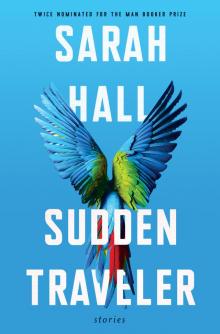 Sudden Traveler
Sudden Traveler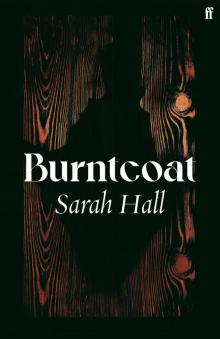 Burntcoat
Burntcoat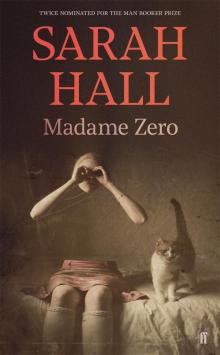 Madame Zero
Madame Zero Mrs Fox
Mrs Fox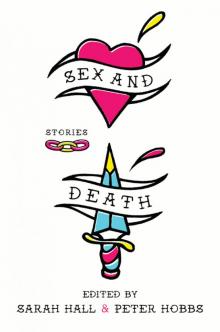 Sex and Death
Sex and Death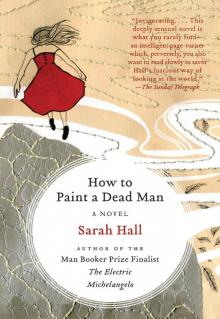 How to Paint a Dead Man
How to Paint a Dead Man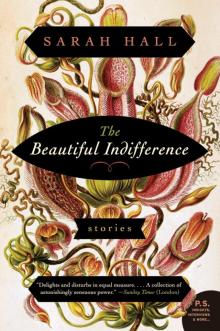 The Beautiful Indifference
The Beautiful Indifference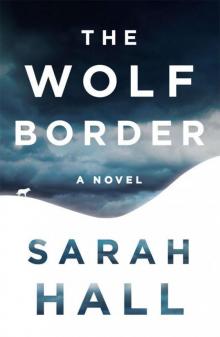 The Wolf Border
The Wolf Border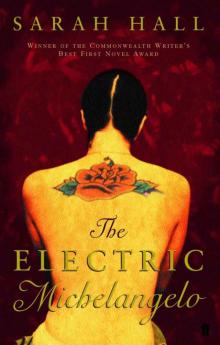 The Electric Michelangelo
The Electric Michelangelo